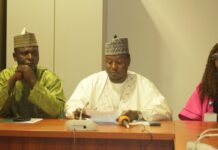The Executive Secretary, National Human Rights Commission (NHRC), Chief Tony Ojukwu, SAN, has said that the Commemoration of the 2022 Day of the African child presented an opportunity to take stock of what has been done with regards to the adoption of policies and practices and reflect on what more needs to be done to effectively eliminate harmful practices affecting children in Africa.
Ojukwu stated this in his remarks during the commemoration of the 2022 Day African Child held in Abuja.
According to the NHRC helmsman, the commemoration further provides an avenue for Governments, UN agencies, International Organizations, NGOs, CSOs and other relevant stakeholders to renew their ongoing engagements towards the protection and assistance of children affected by harmful practices through the organization of specific activities and programs to prevent, protect and assist children who are at risk and victims of harmful practices in Africa.
He further stated that a lot of children are face with physical, sexual and economic violence and exploitation including negative harmful practices among which are early forced marriage, female genital mutilation, and trafficking amongst other things. These issues he further noted, have not only had devastating effect on their lives, it has also negatively impacted on their rights and access to education.
The Executive Secretary also stressed that Government’s commitment to respect fundamental freedoms and human rights is demonstrated by the fact that Nigeria is a party to all major regional and international human rights instruments including, but not limited to the International Covenant on Economic Social and Cultural Rights (ICESCR), Convention on the Rights of the child, African Charter on Human and Peoples Rights and the African Charter on the Rights and Welfare of the Child.
He also said that Government has put on place Domestic Laws such as the Child Rights Act, 2003 and the Universal basic Education Act, 2004 which uphold the Rights of the Child.
His words: “Furthermore, Article 1(3) of the African Charter on the Rights and Welfare of the Child (ACRWC) imposes a duty on State Parties to discourage any custom, tradition, cultural or religious practices inconsistent with rights enshrined therein.
The African Children’s Charter calls on States to take all appropriate measures to eliminate harmful social and cultural practices affecting the welfare, dignity, normal growth and development of the child.
Moreover, article 5 of the Protocol to the African Charter on Human and Peoples Rights on the Rights of women in Africa (Maputo Protocols) states that States Parties must prohibit and condemn all forms of harmful Practices. Agenda 2063, under Aspiration 6, calls for ending all forms of gender-based violence, including practices.
The elimination of all forms of harmful practices is also clearly reflected in the Sustainable Development Goal (SDG) 5 (target 5.3) ‘Eliminate all harmful practices, such as child, early and forced marriage and Female Genital Mutilation (FGM).
Target 16.2 of the SDG seeks to realize the right of every child to live free from fear, neglect, all forms of abuse and exploitation “. Ojukwu also expressed his delight this stakeholders’ forum will avail the stakeholders the opportunity to embark on discussions centered on how to devise and strengthen national accountability mechanisms that will deter harmful practices against children.
According to the NHRC boss, the NHRC’s role in advancing the campaign to end harmful practices affecting children is hinged on its core mandate to promote, protect and enforce the rights of all persons in Nigeria.
He also noted that on the basis of this mandate, the Commission has been at the forefront of measures to fulfill Nigeria’s treaty obligations, including to the UN Child Rights Convention and the African Charter on the Rights and Welfare of the Child.
Again, he stressed that the Commission was a critical partner in the advocacy for the passage of the Child Rights Act 2003, and has been involved in continued advocacy for its adoption into Child Rights Laws of about 26 States in the Federation.
He also revealed that the Commission is a member of the State Child Rights Implementation Committee of several States in Nigeria and has continued to advocate for the mainstreaming of children’s rights in relevant policies of Government.
This he noted also include the Commission’s further prioritization of the child rights in its work through the creation of the Department of Women and Children and the thematic team on the Rights of the Child.
He also explained that through these internal mechanisms, the Commission has consistently taken action to end pervasive child right abuses including: Chil Marriage, Female Genital Mutilation, Sexual and Gender-based Violence, Infanticide, Child trafficking etc.
The Commemoration include experts’ panel discussion on the theme, “Eliminating harmful practices affecting children; Progress on policy and practices since 2013”.
Recall that the Day of the African Child is commemorated every 16th of June and is one of the important internationally observed days, because it reminds the world of the brave action of thousands of students in Soweto, South Africa who rose up against discriminatory practices in the education sector in their country on the 16th of June, 1976, leading to the killing of hundreds of them.











































